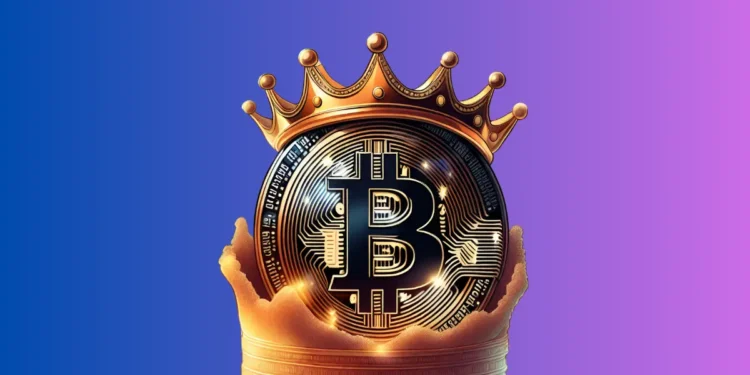Last updated on May 19th, 2025 at 01:01 pm
For many, cryptocurrency feels less like an investment and more like a roll of the dice. The dramatic price swings, meme coins like Dogecoin and Shiba Inu, and the infamous “get-rich-quick” stories create an atmosphere reminiscent of a casino. But does cryptocurrency inherently encourage a gambling mentality, or is it the behaviour of participants that makes it feel that way?
Take Warren Buffett’s view, for instance. The “Oracle of Omaha” doesn’t mince words. “Bitcoin is a gambling token, and it doesn’t have any intrinsic value. But that doesn’t stop people from wanting to play the roulette wheel,” he stated in a 2023 interview with CNBC.
He’s totally not wrong—gamblers chase jackpots, and “most” crypto traders chase 100x gains. In both cases, decisions are often driven by hype and speculation, not deep understanding. But as with gambling, because there are characteristics that encourage such unrealistic pursuits, it doesn’t mean that the crypto market is a gambling den. Let’s discuss why.
Volatility and Uncertainty: The Wild West of Finance
The crypto market is dubbed the “Wild West of finance” for a reason: its extreme volatility. Consider Bitcoin’s price swings: from $40,000 in April 2022 to $16,000 in November of the same year, only to hit an all-time high of over $100,000 in 2024. For thrill-seekers, such volatility is irresistible. But for the unprepared, it’s a recipe for disaster.
Bitcoin’s Price Growth from April 2022 to December 2024. Source: Statista
The appeal to risk-takers is clear. Sudden gains can provide a dopamine rush, akin to gamblers hitting a jackpot. But the emotional crash when prices plummet is just as devastating.
RELATED: Bitcoin and Wealth Inequality: Who Truly Benefits from Perpetual Price Increases?
The FOMO Trap, Sentiments and God-like Influences
The fear of missing out (FOMO) is another factor that fuels reckless behaviour in crypto markets. Stories of ordinary people becoming overnight millionaires are pervasive, triggering impulsive decisions. This cycle of emotional highs and lows often traps investors in risky behaviour, doubling down on losses in a desperate bid to recover. It’s eerily similar to the classic gambling mentality.
Crypto markets are also susceptible to sentiment like the traditional investment markets but on a very extreme level. A single tweet from a high-profile individual, such as Elon Musk, can cause dramatic price swings. For example, on December 20, 2020, Musk tweeted just this phrase: “One Word: Doge.” That simple message caused Dogecoin’s price to surge by approximately 25%, illustrating how emotion-driven and unpredictable the market can be.
Structural Issues That Drive Speculation
And yes, beyond investor behaviour, the structure of the crypto market itself fosters short-term speculation and risk-taking. These structural issues include high-leverage trading, pump-and-dump schemes, and the proliferation of meme coins.
High-leverage trading, widely offered by many crypto exchanges, allows traders to borrow funds to amplify their positions. While this can yield enormous profits, it also magnifies losses, often wiping out retail investors in volatile markets. During the crypto market crash of 2022, leveraged traders lost a staggering $3.8 billion as cascading liquidations intensified the downturn. While appealing to thrill-seekers, high leverage creates a casino-like atmosphere that disproportionately penalizes inexperienced participants.
READ MORE: Understanding How The Actions Of Crypto Whales Impact Cryptocurrency Markets
Pump-and-dump schemes exploit the decentralized and largely unregulated nature of the crypto market. Bad actors coordinate to artificially inflate a token’s price, luring in unsuspecting investors before abruptly selling off their holdings. A notable example is the 2017 Bitconnect scandal, which defrauded investors of over $2 billion. These schemes erode trust in the market and harm retail participants, further perpetuating the gambling narrative.
Over $10 billion has been lost to hacks and scams from 2016. Source: Chainalysis
READ MORE: The Dark Side of Crypto Incentives: How They Fuel Fraud and Unsustainability
Memecoins, like Dogecoin and Shiba Inu, epitomize the speculative side of the crypto market. Often created as jokes or with little intrinsic value, these tokens can skyrocket in value based purely on hype and social media trends. During the 2021 Dogecoin frenzy, its price surged by over 12,000% in a matter of months, driven by celebrity endorsements and online communities. However, the bubble soon burst, leaving latecomers with massive losses. Such phenomena encourage speculative gambling rather than informed investment decisions.
Finally, let’s not ignore the elephant in the room—many crypto investors simply don’t understand what they’re investing in. Terms like “blockchain,” “smart contracts,” and “proof of stake” are either misunderstood or ignored altogether by retail investors. Instead, they focus on price charts and social media hype.
This lack of financial education is a key reason why crypto investing feels like gambling to some. Without proper knowledge, many fall victim to pump-and-dump schemes or invest in tokens with no real utility or value.
However, this doesn’t mean that all crypto investors are gamblers. Those who take the time to research and educate themselves can avoid many pitfalls. Understanding market trends, evaluating token utility, and analyzing project teams can significantly reduce risk. In that sense, cryptocurrency differs from gambling—it allows for informed decision-making.
But Crypto Isn’t Gambling—If You’re Smart About It
Despite these factors, cryptocurrency isn’t inherently gambling. Unlike games of chance, which rely purely on luck, crypto investments allow for analysis, strategy, and informed decision-making. The problem lies in how individuals approach the market.
Research Reduces Risks
Unlike gambling, where outcomes are unpredictable, crypto investing allows for due diligence. Established projects like Bitcoin and Ethereum have demonstrated long-term potential, and careful research can help investors identify promising opportunities. For example, understanding token utility, team credibility, and market trends can significantly reduce risk.
READ MORE: How to Do Your Research (DYOR) in Crypto
Long-Term Thinking Yields the Best Profit Margins
Encouraging long-term strategies, such as staking or asset holding, can also counteract the speculative mindset. Staking mechanisms—like Ethereum’s proof-of-stake model—reward users for locking their assets over time, promoting patience and stability. This is a stark contrast to the high-risk, short-term behaviour often seen in gambling.
Cryptocurrency, when approached responsibly, has much in common with other investments like stocks or real estate. Diversification, strategic planning, and disciplined investing are key to unlocking its potential.
Final Thoughts: Crypto Is What You Make of It
So, does cryptocurrency encourage a gambling mentality? It depends. If you approach it with a get-rich-quick mindset, chasing hype and ignoring risks, then yes—crypto can feel a lot like gambling. But with proper research, a clear strategy, and a focus on long-term goals, it becomes an exciting (albeit volatile) asset class with real opportunities for growth.
We can take a clue from Buffet and his fellow crypto adversaries once again. Charlie Munger, Buffet’s longtime friend and partner, once said, “In my life, I try to avoid things that are stupid, evil, and make me look bad.”
The same wisdom applies here—approach crypto responsibly, and you’ll avoid the pitfalls that make it look like a casino. At the end of the day, cryptocurrency is a tool. Use it wisely, and it can help you build wealth. Use it recklessly, and it might feel like rolling the dice.
As the saying goes, “Invest only what you’re willing to lose.” Whether you treat crypto as an investment or a gamble, that advice remains timeless.
Disclaimer: This piece is intended solely for informational purposes and should not be considered trading or investment advice. Nothing herein should be construed as financial, legal, or tax advice. Trading or investing in cryptocurrencies carries a considerable risk of financial loss. Always conduct due diligence.
If you would like to read more articles like this, visit DeFi Planet and follow us on Twitter, LinkedIn, Facebook, Instagram, and CoinMarketCap Community.
Take control of your crypto portfolio with MARKETS PRO, DeFi Planet’s suite of analytics tools.






















